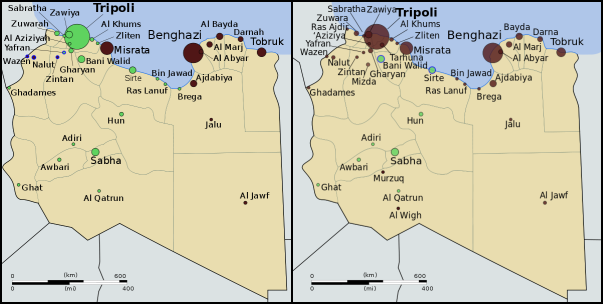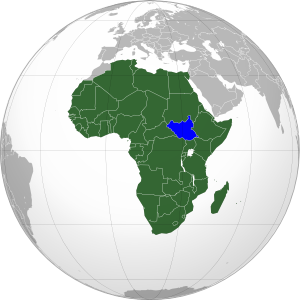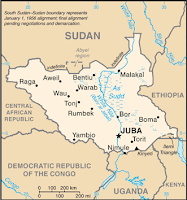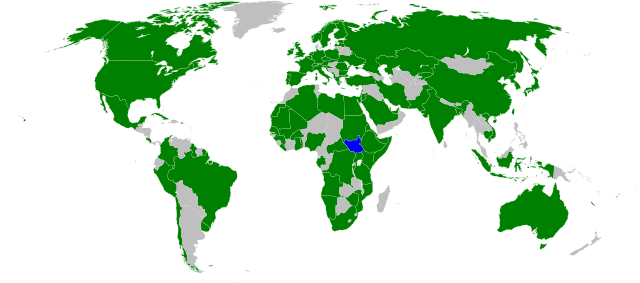Yemen: Militias Take Territory From Islamists
 |
| Territory and areas of influence for rebels (blue) and Islamic extremists (red) in Yemen. Map is my own work, starting from this map by German Wikipedia user NordNordWest (license: CC BY-SA). (Corrected November 20, 2011) |
Sudan No Longer Africa's Largest Country
Now that the South Sudan has gained independence (See: New Country - South Sudan), the remainder of Sudan is no longer Africa's largest country by area. Sudan's one-time top spot was followed by Algeria in second place and the Democratic Republic of the Congo in third. However, the secession of South Sudan removed a substantial portion of Sudan's territory, and the northern remainder of the country now ranks third in Africa - after Algeria and the DRC. South Sudan ranks 19th, out of a total of 54 U.N.-recognized countries in Africa. (Graphic my own work, based on this map by Wikipedia user Mangwanani. License: CC BY-SA)
 |
Map showing most of the Cooch Behar |
Indo-Bangladesh Treaty Defines Border, Trades Enclaves
A treaty signed last month between the governments of India and Bangladesh fully defines the border between the two countries, and provides for the trade of dozens of enclaves. The Indo-Bangladesh enclaves, also known as "chitmahals" or the "Cooch Behar enclaves" (after the district of India which most of them either belong to or are located inside), number well over 100, including patches of Indian territory within Bangladesh and patches of Bengladeshi territory within India. Their inhabitants have long suffered under abominable living conditions due to the fact that they have access neither to services from their own country (because of their isolation) nor to services from the country surrounding them (because they are not considered part of its territory). Under the new agreement, based on a 1974 deal that was never adopted, nearly all of the enclaves will be ceded to whichever country surrounds them, and inhabitants will have a choice of citizenship. The two parties also defined the border in several previously disputed or undemarcated areas. The treaty will not go into effect until it is ratified by both countries' legislatures.
 |
| Location of Rastan within Syria. Based on this map by German Wikipedia user NordNordWest. License: CC BY-SA |
In Syria's ongoing uprising, the city of Rastan fell under control of protester-friendly rebel forces for a few weeks last month, before ultimately being retaken by government troops. The crisis in Syria, seen as part of the so-called "Arab Spring" movement for democratic change in the Middle East, began with protests last January. By march it had escalated to widespread displays of defiance in the streets, to which the government responded by sending in tanks and soldiers. However, the resistance was mostly unarmed until army defectors began organizing against the military in September. The city of Rastan, one of several major protest centers, was taken over by anti-government forces, which were not driven out until October 1. So far there have been no more reports of Syrian cities falling under armed anti-government control, but protests and violent government crackdowns continue in full gear.










